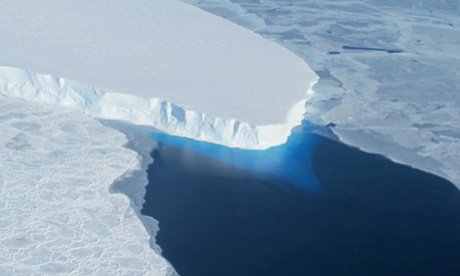Study: Melting ice in west Antarctica could raise seas by 10 feet


A free daily email with the biggest news stories of the day – and the best features from TheWeek.com
You are now subscribed
Your newsletter sign-up was successful
Scientists on Monday said melting ice in west Antarctica could raise global sea levels by nearly 10 feet.
Using computer models, researchers at Potsdam Institute for Climate Impact Research in Germany found that the Amundsen Sea area of west Antarctica "has most likely been destabilized," and if the ice melts for 60 more years at its current rate, it "would drive the west Antarctic ice sheet past a critical threshold beyond which a complete, long-term disintegration would occur," meaning "the entire marine ice sheet will discharge into the ocean, causing a global sea level rise of about three meters," or almost 10 feet. Furthermore, the team said, "if the destabilization has begun, a three meter increase in sea level over the next several centuries to millennia may be unavoidable."
The researchers wrote in the journal Proceedings of the National Academy of Sciences that all it takes is a few decades of ocean warming to trigger hundreds to thousands of years of melting ice, Agence France-Presse reports. "Once the ice masses get perturbed, which is what is happening today, they respond in a non-linear way: There is a relatively sudden breakdown of stability after a long period during which little change can be found," lead author Johannes Feldman explained. The researchers said they do not know if the destabilization is caused by greenhouse gas emissions, but author Anders Levermann said "it is clear that further greenhouse gas emissions will heighten the risk of an ice collapse in west Antarctica and more unstoppable sea level rise."
The Week
Escape your echo chamber. Get the facts behind the news, plus analysis from multiple perspectives.

Sign up for The Week's Free Newsletters
From our morning news briefing to a weekly Good News Newsletter, get the best of The Week delivered directly to your inbox.
From our morning news briefing to a weekly Good News Newsletter, get the best of The Week delivered directly to your inbox.
The team says much more research needs to be conducted in the region, which will be a difficult task. Last year, NASA glaciologist Eric Rignot published research saying the melting of ice in the Antarctic was "unstoppable" and could raise sea level by 1.2 meters, or almost four feet, AFP reports.
A free daily email with the biggest news stories of the day – and the best features from TheWeek.com
Catherine Garcia has worked as a senior writer at The Week since 2014. Her writing and reporting have appeared in Entertainment Weekly, The New York Times, Wirecutter, NBC News and "The Book of Jezebel," among others. She's a graduate of the University of Redlands and the Columbia University Graduate School of Journalism.
-
 Political cartoons for February 14
Political cartoons for February 14Cartoons Saturday's political cartoons include a Valentine's grift, Hillary on the hook, and more
-
 Tourangelle-style pork with prunes recipe
Tourangelle-style pork with prunes recipeThe Week Recommends This traditional, rustic dish is a French classic
-
 The Epstein files: glimpses of a deeply disturbing world
The Epstein files: glimpses of a deeply disturbing worldIn the Spotlight Trove of released documents paint a picture of depravity and privilege in which men hold the cards, and women are powerless or peripheral
-
 Nobody seems surprised Wagner's Prigozhin died under suspicious circumstances
Nobody seems surprised Wagner's Prigozhin died under suspicious circumstancesSpeed Read
-
 Western mountain climbers allegedly left Pakistani porter to die on K2
Western mountain climbers allegedly left Pakistani porter to die on K2Speed Read
-
 'Circular saw blades' divide controversial Rio Grande buoys installed by Texas governor
'Circular saw blades' divide controversial Rio Grande buoys installed by Texas governorSpeed Read
-
 Los Angeles city workers stage 1-day walkout over labor conditions
Los Angeles city workers stage 1-day walkout over labor conditionsSpeed Read
-
 Mega Millions jackpot climbs to an estimated $1.55 billion
Mega Millions jackpot climbs to an estimated $1.55 billionSpeed Read
-
 Bangladesh dealing with worst dengue fever outbreak on record
Bangladesh dealing with worst dengue fever outbreak on recordSpeed Read
-
 Glacial outburst flooding in Juneau destroys homes
Glacial outburst flooding in Juneau destroys homesSpeed Read
-
 Scotland seeking 'monster hunters' to search for fabled Loch Ness creature
Scotland seeking 'monster hunters' to search for fabled Loch Ness creatureSpeed Read
